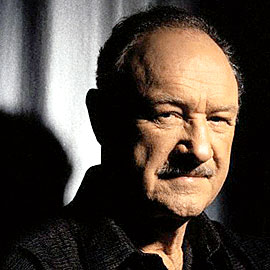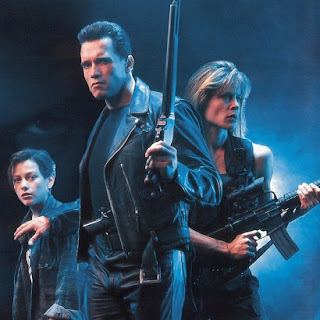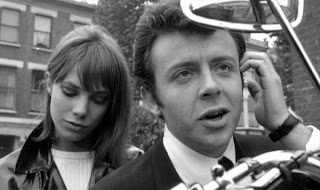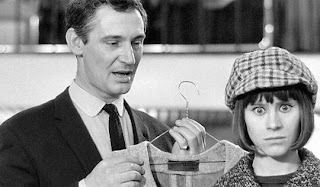Well, another Cannes Film Festival has ended and it was a bit underwhelming to say the least. Despite a great line-up of films that I was really excited to hear about and want to see where it started off nicely with Wes Anderson's Moonrise Kingdom. And then... things got a little crazy where new films by Matteo Garrone, Cristian Mungiu, Carlos Reygadas, Ken Loach, Jacques Audiard, Abbas Kiarostami, Alain Resnais, and several others either didn't receive great responses or got mixed reviews in the process. The American films competing like Lawless by John Hillcoat and Mud by Jeff Nichols also received mixed reaction while Lee Daniels' The Paperboy got a notorious thrashing at Cannes though there were a few positives for that film. David Cronenberg's highly-anticipated Cosmopolis also received mixed reviews.
I think my disappointment over this year's festival was that there wasn't a lot that stood out. While there's a new Michael Haneke film called
Amour that I heard some excellent reviews as it just won the Palme D'or. I was more excited about the buzz for Leo Carax's
Holy Motors for the fact that it was way out there. That I'm probably more excited to see as I've only seen bits of Carax's
Lovers on the Bridge as well as a short he did for the 2008 anthology film
Tokyo that I really loved. Yet, I'm surprised he didn't win anything for that film.
As I'm reading on what did win where I'm happy that Carlos Reygadas got the Best Director prize for Post Tenebra Lux as well as a Best Actor prize to Mads Mikkelsen for Thomas Vinterberg's comeback film The Hunt. I was surprised that Cristian Mungiu's Beyond the Hills got a couple of awards for Best Screenplay and a Best Actress prize to two of its female leads in Cosmina Stratan and Christina Flutor. I'm happy got the Jury prize while I'm excited that Beasts of the Southern Wild got the Camera D'or first film prize which is totally awesome. Another surprise I'm reading through Indie Wire is that Matteo Garrone's Reality got the 2nd place Grand Jury Prize despite the mixed reviews it received.
If anything, the choices of who will win is often unpredictable which is what the Cannes Film Festival does. I'm just disappointed over the fact there wasn't more fierce competition or an air of unpredictability to happen. While I was excited about the bad reviews of The Paperboy that I really want to see just because I'm interested in seeing how bad it is. There's a lot of films playing in the competition I'm eager to see and probably will but I think my expectations will be lowered. Since it's likely that new films from Lars von Trier and Sofia Coppola are likely to arrive at next year's Cannes. Let's just hope the festival brings von Trier back just so that things can get more exciting and dangerous. After all, Lars von Trier puts asses in the seat including mine!
Now that the festival is over, there's a couple of blogs I think should be thanked for their coverage that made things worthwhile to read. The first is Bonjour of
Bonjour Tristesse whose coverage for the festival was a delight to read. The other is Marshall of
Marshall and the Movies where he did something that is a blogger's dream. He actually went to the festival and his coverage is another great read to capture the experience of what it's like to be there. It just makes me want to go so bad. I want to have a shot to go to next year's and do some coverage on the 2013 Cannes Film Festival and I would want my first film to play at the festival and have a shot at the Camera D'or.
Now to the Cannes marathon itself. Well, not surprisingly, it was a step-down from last year as I had to make a few last minute changes and such. I think next year, I will have to choose the films more carefully but also make it more interesting. Still, there were some discoveries that I saw and enjoyed. I opened and close the marathon with two films I had seen before but never got to review as it started off with a bang with Spike Lee's
Do the Right Thing and closed with style with Baz Luhrmann's
Moulin Rouge. Then there's the 14 other films that I saw. A lot of which were amazing while one of them became what I think is the worst film I had seen since watching
Southland Tales a few years ago in my experience doing the Cannes Marathon. So now, it's up for my versions of the Cannes Marathon Awards.
The Palme D'or for Best Film of the Marathon goes to...
Silent Light.
This was the real surprise for me as I wasn't expecting anything other than an arty film with a lot of long takes. What I got was a whole lot more than that. I've been hearing about this film for years and I decided to finally just see it. I didn't expect this film to move at a nice pace for something that is filled with not much plot nor a lot of dialogue. It worked for some odd reason and I wasn't expecting to work at all. I was moved by the film's final moments and I was really entranced by what I was watching. If Post Tenebras Lux does get to play sometime later in the year or early next year, I will definitely do an Auteurs piece on Carlos Reygadas. This dude is for real.
If it wasn't for Silent Light, this film would've won my version of the Palme D'or. It had all of the elements I expected in an epic but I was more into Andrei Tarkovsky's visual style that was truly seductive to watch. From the scenes in the forest with all of those trees to the more intimate moments. There is never a dull moment in that film as it just adds to my interest in Tarkovsky as I will do an Auteurs piece on him this coming August.
The third place Jury Prize goes to
Thirst
What a film! This was easily the most entertaining film, aside from Moulin Rouge! that I saw in the marathon. It's the vampire film that I never thought would be exciting but also fun. I love Chan-wook Park's direction and how he created a vampire-romance film that wasn't schmaltzy or have stupid BEEEEELLLLL, SOOOKIIIEEE or EEEDDDDWARRDDDD, BBEEEELLLLLLLLAAAA! bullshit. It's got style, it's got great characters. Great fucking movie.
The Best Director Prize goes to Jim Jarmusch for Dead Man.
Very stylized yet it is truly a work of art in how Jarmusch is willing to deconstruct the idea of the Western. Some said that Jarmusch was trying to create a Tarkovsky western. Well, he was quite close as there's a lot of Tarkovsky visual touches in the film but also a lot of offbeat humor and compositions that Jarmusch is known for. It's really the work of a filmmaker who is very confident in what he tries to do where it's really one of the best westerns of the last 20 years.
The Best Actor Prize goes to Jack Lemmon for Missing.
There was a lot of actors in the films I saw that I was sure was going to create some competition. Then I saw Jack Lemmon's award-winning performance for Costas-Garvas' Missing and I realize early on that this was going to be tough to beat. Once the marathon was ending, I realized it was no contest. From the passionate monologues he gives to the heartbreaking scene in the stadium trying to find his son amidst a large group of people as he's speaking to them. The physicality in how he reacts to devastating news is the world of a master. I've seen Lemmon in some films, old and recent, but this is definitely one of his essential performances.
The Best Actress Prize goes to Gabourey Sidibe for Precious and Rita Tushingham for The Knack... and How to Get It (tie).

This was difficult as there's a slew of great performances from actresses like Kim Ok-bin from Thirst, Shelley Duvall from 3 Women, and Celia Johnston from Brief Encounter. Yet, it ended becoming a draw between Gabourey Sidibe and Rita Tushingham. Two very different performances in two very different films but both women give fantastic performances that are unforgettable. Sidibe in the more gritty Precioius is a debut that no one will forget for how she portrays a young African-American woman trying to find hope in a dreary world of abuse. Tushingham is the more comical performance as a confused woman from the country who arrives to Swingin' London in the 1965 Palme D'or winner The Knack... and How to Get It has Tushingham bring a lot of charm to her role including the film's very silly third act. Sidibe and Tushingham should share the prize as they both display incredible works in the art of acting.
The Best Screenplay Prize goes to Charles Wood for The Knack... and How to Get It.
Charles Wood's adapted screenplay, from Ann Jellicoe's play of the same name, is a truly whimsical screenplay that is very off-the-wall in its approach to narrative as it has a looseness rarely told on script. While it's a narrative that is about a group of three men trying to win the affections of a country girl arriving into Swingin' London. It's also a film that features a Greek chorus of middle-aged to elderly people commenting on this new world and how they believe that things will be bad. Woods' script would allow director Richard Lester to help play out the story's whimsical tone as it is a truly fantastic story that is a lot of fun to see.
The Technical Prize goes to Martin Hernandez and Sergio Diaz for Silent Light.
The sound work that Martin Hernandez and Sergio Diaz did in Silent Light is unlike a lot of the sound work that is expected in film. At times, it's very intimate and sparse for some of the exterior locations that is set to maintain a sense of silence. At times, it's very intoxicating for the way shoes sound on the ground and how the weather can set a mood such as a big scene outside in the rain. The film's climatic ending is sound work at its best because it's so low-key that it's small moments are very unexpected.
The Special Jury Prize goes to Sissy Spacek for Missing and 3 Women.
There's several actors who appears in more than one film in this marathon yet it's Sissy Spacek in two amazing performances in Costas-Garvas' Missing and Robert Altman's 3 Women is an indication of why she is one of the best American actresses out there. From her complex and hypnotic performance as the shy Pinky in 3 Women who becomes a much wilder, cold young woman to the concerned wife in Missing who tries to deal with her father-in-law in finding her husband in 1973 Chile where she manages to act with the likes of Jack Lemmon. Two thrilling performances from Spacek that is a must-see for anyone who know her recently for movies like The Help and Hot Rod.
And now here is the ranking for the 11 other films that I saw in the marathon:
Jim Jarmusch's entrancing black-and-white western is a true tour-de-force film that plays to a lot of its myth as it features a truly incredible performance from Johnny Depp as well as hypnotic score by Neil Young
Costas-Garvas' chilling film about a man and his daughter-in-law trying to find his son during the 1973 coup of Chile as it's a very engrossing drama that unveils the dark world of politics and abduction.
Richard Lester's charming and hilarious film about three different men who try to win the affections of a country girl in Swingin' London as it explores the world of male domination and how this young outsider manage to find her way in a new world filled with new attitudes frowned upon by the old.
Lee Daniels' adaptation of Sapphire's Push is a chilling yet stylized film about a 16-year old pregnant and obese African-American girl trying to find hope in her dreary life as well as escape the horrific abuse of her mother that adds to the harrowing melodrama of the film.
Robert Altman's surreal yet evocative story of identity features marvelous performances from Shelley Duvall and Sissy Spacek as two different women whose persona are changed due to strange moments where they each become different people.
Xavier Beauvois' exhilarating drama about the real life incident involving a group of monks trying to live a peaceful live during the 1996 Algerian Civil War as it is a wonderful tale of faith and humanity during a horrible moment in time.
David Lean's glorious adaptation of Noel Coward's one-act play Still Life is a melodramatic yet ravishing look into the world of extramarital affairs that features incredible performances from Celia Johnson and Trevor Howard.
Roberto Rossellini's landmark neo-realist film about Nazi-occupied Italy where a priest tries to aid the Italian resistance in this harrowing film about war and humanity.
Martin Scorsese's epic film about a young man's vengeance against his father's killer during a crucial period in 1860s NYC as it features magnificent performances from Leonardo DiCaprio and Daniel Day-Lewis.
Michael Winterbottom's chilling film set during the Bosnian War of the early 1990s as it revolves around a reporter trying to save an orphan during the war as he's also covering a war the Western world doesn't know much about.
Despite Rachel Weisz's charismatic performance, Agora is a truly bloated and messy film that relies too much on drama and romance and not enough on historical accuracy and intelligence as it's one of the worst films to every play at Cannes.
Well, that is for the Cannes marathon for 2012. Until next time, we'll meet again next year and please bring Lars von Trier back to Cannes!!!


















































